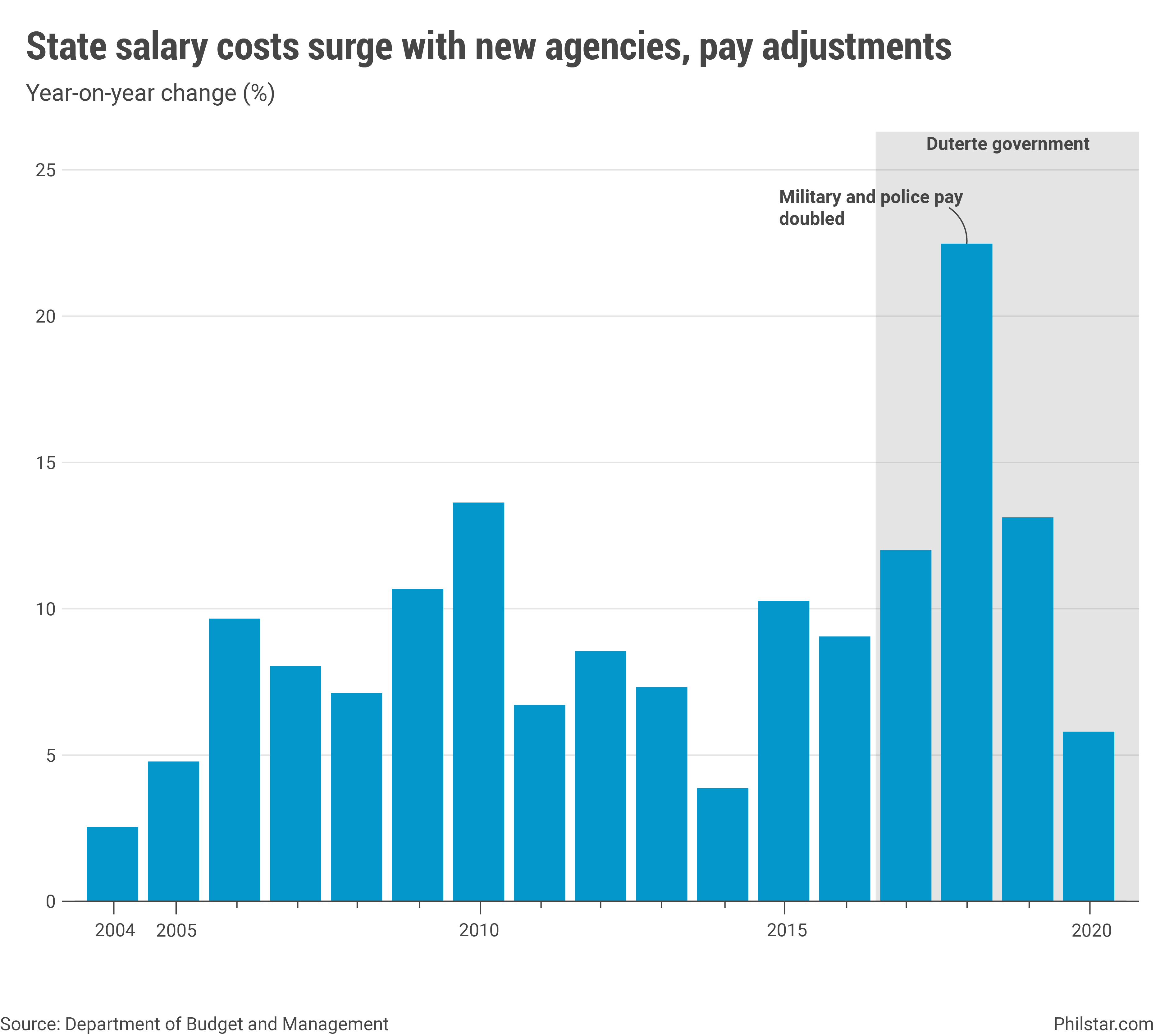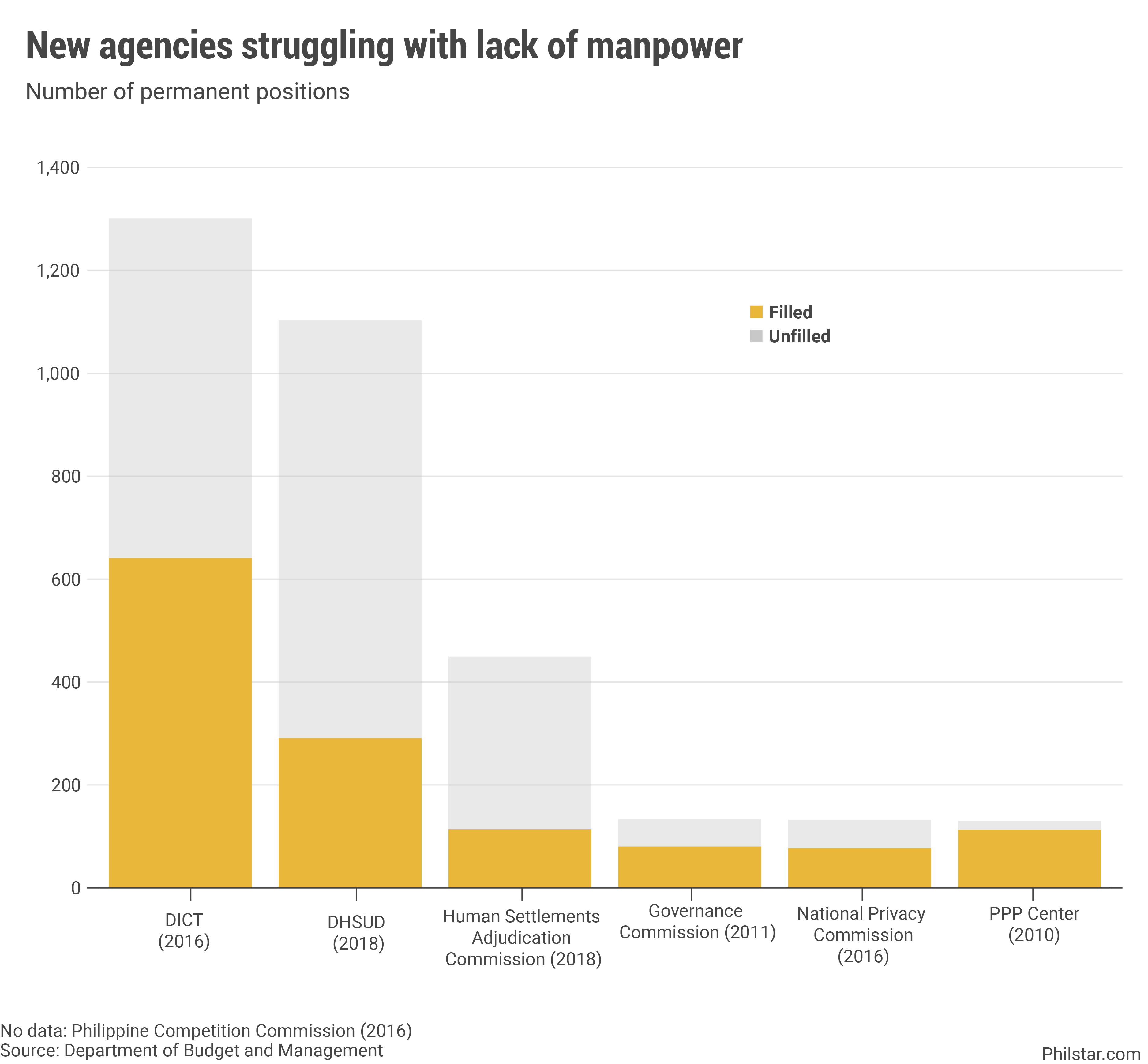Duterte out to bloat gov't with undermanned, underfunded agencies

MANILA, Philippines — President Rodrigo Duterte promised federalism to ensure prosperity is spread beyond Metro Manila. A key component of that requires delegating more responsibilities to cities and provinces. That will still happen next year through another method, but the national government will remain as bloated as ever.
Proposals pending in Congress to build new offices have seen their way into Duterte’s priority legislative agenda before he steps down in June 2022. The bills replaced a rightsizing measure thrown out from the list after being there since 2016 due to tepid backing from lawmakers.
Now, four new agencies are eyed, two of which are Cabinet-level offices supposedly intended to address migrant worker woes and disaster response. One agency, a local version of the US’ Centers for Disease Control, gained traction due to views that the pandemic has been grossly mishandled, while another will serve as oversight of the newly rehabilitated Boracay Island.
While designated with their own goals, concerns had been raised whether stand-alone agencies are actually needed to deal with such granular tasks. Ronald Mendoza, dean of Ateneo School of Government, said the costs of adding another layer of bureaucracy and potential benefits out of that should be very well studied.
“At any point in time, there are many competing demands for public services, but creating new agencies is not always the best response to them, especially in light of fiscal sustainability,” Mendoza said in an email.
And indeed, under Duterte, while a Supreme Court ruling will force the branching out of state services to the grassroots, there would still be a commensurate bloating at the national level. For instance, personnel costs which include state worker salaries registered a 9.9% compounded annual growth during Duterte’s first 4 years, up from just a 6% uptick under the Aquino administration and 8.8% under last full term of former president Gloria Arroyo.
Part of the increase were driven by several tranches of salary adjustments meant to counter inflation and attract new talents to government service. Salary standardization efforts are typical, yet even accounting to these effects, Duterte shelled out way more particularly because police and military pay adjustments came in early. In 2018 alone, personnel spending rose 22.1% year-on-year to P987.2 billion.

Inevitably, Budget Undersecretary Laura Pascua said new agencies will add to this spending. Hence, while infrastructure investments— and last year, pandemic needs— do partially explain budget increases over the years, salaries for personnel filling up these offices, which represent the bulk of budget, are also to blame. This is not to say we should not give state workers their due, rather whether additional funds needed would have gone to a better purpose while achieving similar goals.
“Of course we balance fiscal concerns and efficiency. And we advise the agency on the best and fastest way to get running,” Pascua said in a Viber message. "As I said, we give it (agency) a starting budget and see how it performs and justifies its programs.”
Lack of manpower
This is where another problem lies. Instinctively, an agency needs manpower to function, but limited resources shared across a constantly expanding government means newer agencies get miniscule budget to operate at the onset, or sometimes even years after. Take the housing department built in 2018 as an example. In 2021, its budget was even cut 36% year-on-year to P4.98 billion.
It is for this reason that economic managers have been cool about latest proposals to have a larger bureaucracy. With tax receipts taking a hit from the pandemic-induced consumption wreck, having a disaster and OFW departments, for instance, would cost taxpayers a lot first before even these agencies get the job done. That is, if they even do so in a couple of years.
Limited funds mean agencies are incapable of filling up vacancies, hampering public service. In fact, this is a situation also present in relatively new agencies created by recent laws like the Department of Information and Communication Technology, in charge of the daunting task to see to it that the third telco delivers as promised.

To an extent, unfilled permanent posts are part of reasons the rightsizing bill has not advanced, said a source who attended the Legislative-Executive Development Advisory Council that drew up the latest priority bills. She declined to be named because she is not authorized to speak to the media.
“There is no appetite for it in Congress. Also, there are a lot of position in other agencies still yet to be filled. Maybe what is needed is better skilled and equipped personnel instead of a right-sized bureaucracy,” she said.
- Latest
- Trending





























